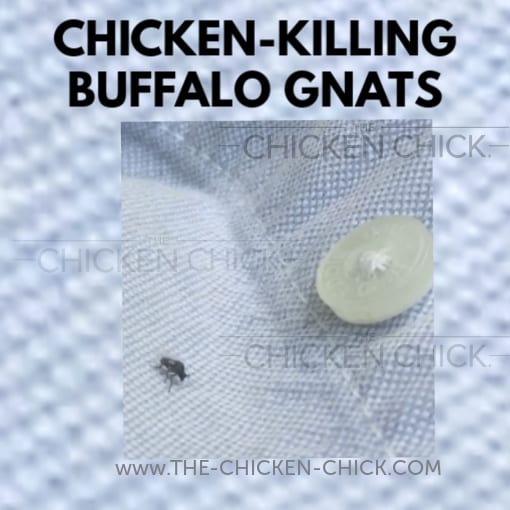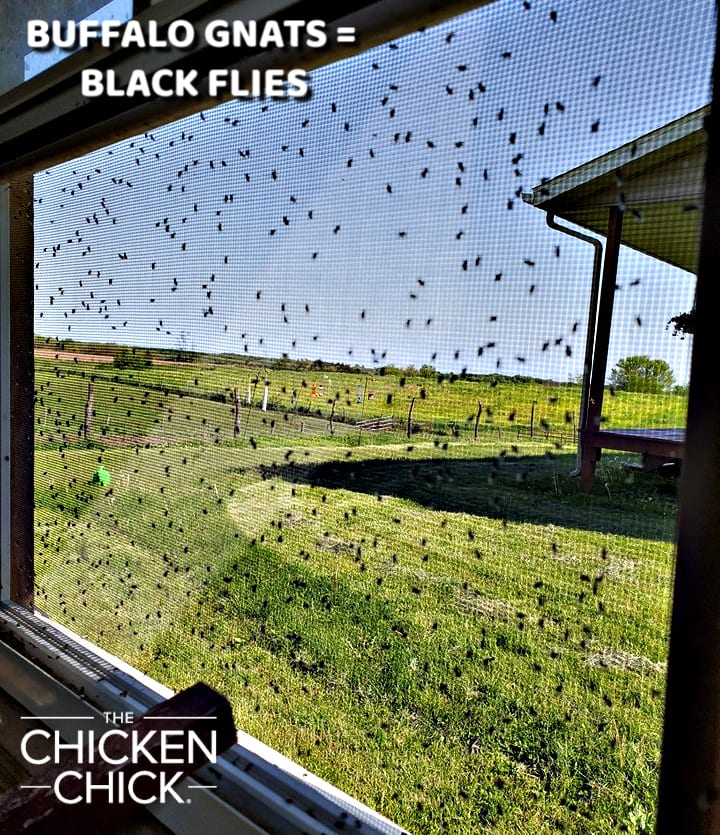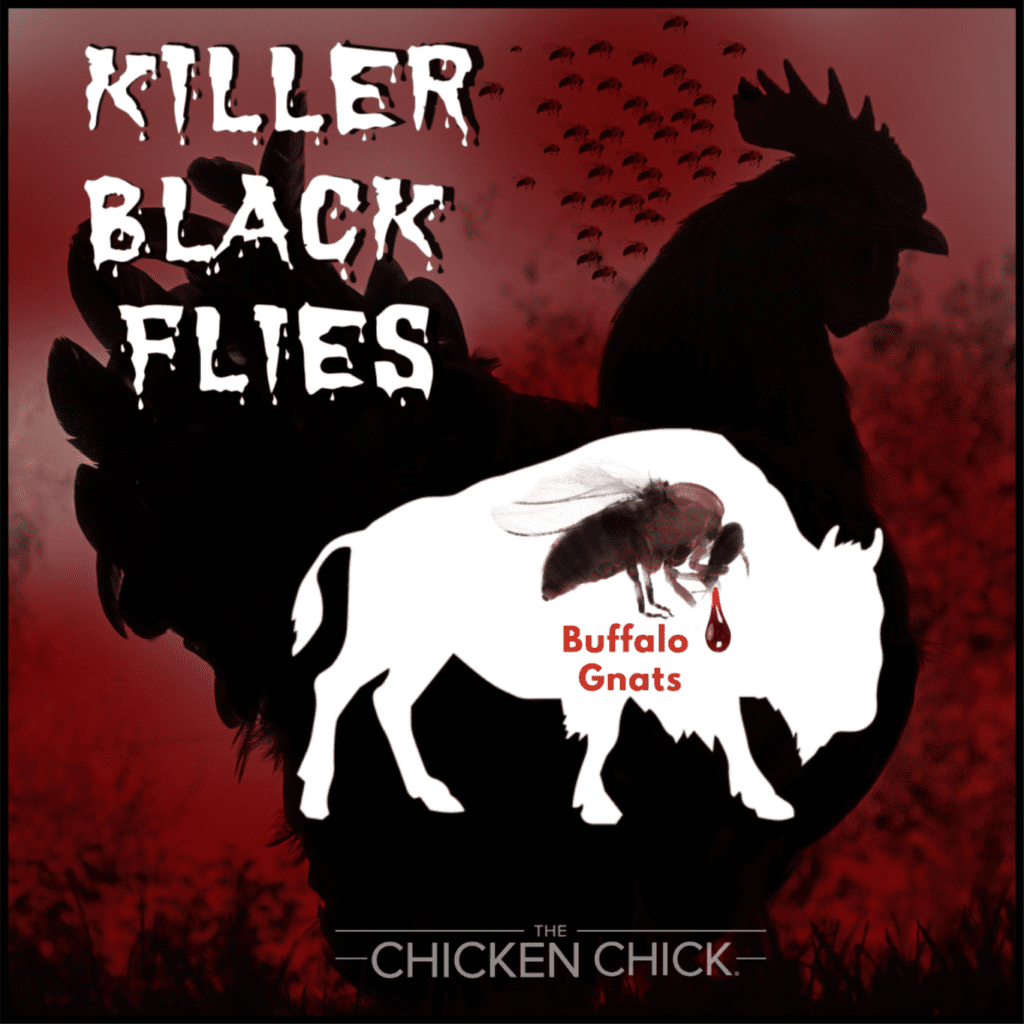Backyard chicken keepers don’t typically think of insects as predators, but certain flies within the Simuliidae family can be every bit as deadly to chickens as a fox or hawk. Also known as buffalo gnats and turkey gnats, these tiny, biting flies, which may attack victims in swarms, are a painful nuisance to humans, but a deadly threat to animals. Knowing when they attack is the key to guarding backyard chickens against their onslaught.
Despite their name, black flies can be a variety of colors, but you’ll know when they’re in your area as they make enjoying the out-of-doors impossible. The females inflict painful bites, drawing blood from their victims while injecting a toxic saliva cocktail that causes itching, swelling and worse.

Buffalo gnats are so named due to the hump on their backs that resembles a buffalo’s.

Buffalo gnats (shown on window screen) killed 30 chickens on this Illinois property in May, 2019.
WHEN & WHERE BLACK FLIES ARE PROBLEMATIC
During late spring and early summer, buffalo gnats can be found along rivers and streams, but may travel up to ten miles away therefrom. The female buffalo gnat lays its eggs in clear, moving water with temperatures in the high 50’s, low 60’s, which means after an especially rainy spring season, they can be expected to be a problem.
Female black flies bite their victims to extract blood to nourish their developing eggs. These blood feasts occur outdoors, usually after dawn and before dusk.

4 WAYS BLACK FLIES CAN KILL CHICKENS
1. Toxic Shock
After a black fly’s blood meal, toxins in the saliva injected into the bite site can cause anaphylactic shock in chickens, resulting in sudden death.
2. Blood Loss
Anti-coagulants in the black flies’ saliva can cause profuse bleeding and death in the victim by hemorrhage.
3. Suffocation
Swarming black flies can suffocate a chicken by obstructing its
airway.
4. Disease
Bites from black flies can result in disease transmission; in particular, chickens are susceptible to contracting leucocytozoonosis from buffalo gnats, which may ultimately result in death.

3 TIPS TO PROTECT CHICKENS FROM BLACK FLIES
Unfortunately, protecting chickens from buffalo gnats is not as straightforward as managing other fly populations in the chicken yard.
1. Keep chickens inside a dark coop or barn during daytime hours- at least in the evening prior to sunset and in the morning just after dawn. Black flies are daytime feeders that tend not to venture indoors.
2. Employ a fan inside the coop; black flies dislike turbulent air.
3. Apply a poultry-safe product such as Elector PSP to chickens and coop during black fly season.
LOCAL RESOURCES
Contact your state’s Department of Agriculture Cooperative Extension Service agent for specific information about buffalo gnats in your area.
Sources available upon request.
Kathy Shea Mormino
Affectionately known internationally as The Chicken Chick®, Kathy Shea Mormino shares a fun-loving, informative style to raising backyard chickens. …Read on


shop my SPONSORS
Backyard chicken keepers don’t typically think of insects as predators, but certain flies within the Simuliidae family can be every bit as deadly to chickens as a fox or hawk. Also known as buffalo gnats and turkey gnats, these tiny, biting flies, which may attack victims in swarms, are a painful nuisance to humans, but a deadly threat to animals. Knowing when they attack is the key to guarding backyard chickens against their onslaught.
Despite their name, black flies can be a variety of colors, but you’ll know when they’re in your area as they make enjoying the out-of-doors impossible. The females inflict painful bites, drawing blood from their victims while injecting a toxic saliva cocktail that causes itching, swelling and worse.

Buffalo gnats are so named due to the hump on their backs that resembles a buffalo’s.

Buffalo gnats (shown on window screen) killed 30 chickens on this Illinois property in May, 2019.
WHEN & WHERE BLACK FLIES ARE PROBLEMATIC
During late spring and early summer, buffalo gnats can be found along rivers and streams, but may travel up to ten miles away therefrom. The female buffalo gnat lays its eggs in clear, moving water with temperatures in the high 50’s, low 60’s, which means after an especially rainy spring season, they can be expected to be a problem.
Female black flies bite their victims to extract blood to nourish their developing eggs. These blood feasts occur outdoors, usually after dawn and before dusk.

4 WAYS BLACK FLIES CAN KILL CHICKENS
1. Toxic Shock
After a black fly’s blood meal, toxins in the saliva injected into the bite site can cause anaphylactic shock in chickens, resulting in sudden death.
2. Blood Loss
Anti-coagulants in the black flies’ saliva can cause profuse bleeding and death in the victim by hemorrhage.
3. Suffocation
Swarming black flies can suffocate a chicken by obstructing its
airway.
4. Disease
Bites from black flies can result in disease transmission; in particular, chickens are susceptible to contracting leucocytozoonosis from buffalo gnats, which may ultimately result in death.

3 TIPS TO PROTECT CHICKENS FROM BLACK FLIES
Unfortunately, protecting chickens from buffalo gnats is not as straightforward as managing other fly populations in the chicken yard.
1. Keep chickens inside a dark coop or barn during daytime hours- at least in the evening prior to sunset and in the morning just after dawn. Black flies are daytime feeders that tend not to venture indoors.
2. Employ a fan inside the coop; black flies dislike turbulent air.
3. Apply a poultry-safe product such as Elector PSP to chickens and coop during black fly season.
LOCAL RESOURCES
Contact your state’s Department of Agriculture Cooperative Extension Service agent for specific information about buffalo gnats in your area.
Sources available upon request.
































Great article and information. I’ve never heard of these specific black flies.
So scary, I’m going to be worried all the time
Great information on black flies. I will be looking for them this year and will be ready. I would really love to win the poultry netting as I would like to let my chickens out in a bigger area.
Hi Kathy. I am a newbie that feels (probably) as vulnerable as my chickens (all hens, somehow). I constantly look out my windows, walk to their yard outside their coop, and talk to them just to make sure they are well. I am nervous about things that can get to them via: air, ground, or digging under. I have spent all I can for their coop, their food, and all their necessities of a good life, I never knew I needed an electric fence net. This sure would alleviate some of my anxiety knowing they are safer and protected. I… Read more »
Thank you for the tips on black flies. I never knew about this predator.